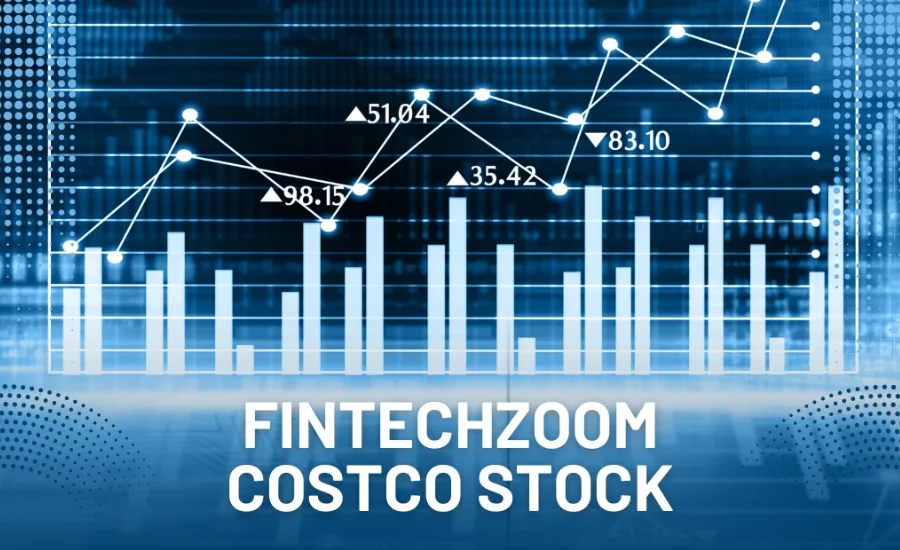FintechZoom Costco Stock: A Complete Investorial Guide
Investing in the stock market can be both an art and a science, requiring a delicate balance of intuition, research, and strategy. Among the myriad of opportunities available, FintechZoom Costco Stock Wholesale Corporation (NASDAQ: COST) stands out as a noteworthy contender for any portfolio. Known for its robust business model and loyal customer base, Costco has consistently delivered strong financial results, making it an attractive option for investors. This guide aims to provide an in-depth analysis of Costco stock, covering everything from its historical performance and financial health to future growth prospects and investment strategies. By the end of this article, you’ll have a comprehensive understanding of Costco’s position in the market and how to approach investing in this retail giant.
Understanding FintechZoom Costco’s Stock Business Model
The Costco Membership Model
FintechZoom Costco Stock operates on a unique business model that sets it apart from other retailers. At its core, Costco is a membership-only warehouse club, which means that customers must pay an annual fee to shop at its stores. This membership model is a significant driver of the company’s revenue, providing a steady and predictable stream of income. There are two primary membership types: Gold Star and Executive. The Gold Star membership is the standard option, while the Executive membership offers additional perks, including 2% cash back on eligible purchases.
This membership-based approach fosters a strong sense of loyalty among customers. The value proposition is simple: by paying an upfront fee, members gain access to a wide range of products at lower prices than traditional retail stores. Costco achieves these lower prices by selling products in bulk and operating with slim margins. The company’s ability to negotiate favorable terms with suppliers further enhances its competitive edge.
Revenue Streams Beyond Retail Sales
While most consumers associate Costco with its retail operations, the company has several other revenue streams that contribute to its financial success. One of the most significant is its private label brand, Kirkland Signature. Kirkland products are known for their high quality and competitive pricing, often rivaling or surpassing national brands. This has led to a high penetration rate of Kirkland products within Costco’s inventory, boosting profitability.
In addition to its private label, Costco generates revenue through its gas stations, food courts, and e-commerce platform. The company’s gas stations are particularly noteworthy, offering fuel at lower prices than many competitors. This not only drives additional foot traffic to Costco locations but also strengthens the overall value proposition for members.
Costco’s e-commerce platform has been another area of growth, especially in the wake of the COVID-19 pandemic. While online sales still represent a smaller portion of the company’s total revenue, Costco has been investing heavily in its digital infrastructure to enhance the online shopping experience. This is a crucial area to watch, as the retail landscape continues to shift toward digital channels.
Global Presence and Expansion Strategy
Costco’s success is not limited to the United States. The company has a significant global presence, with stores in Canada, Mexico, the United Kingdom, Japan, South Korea, Taiwan, Australia, and other countries. International operations account for a substantial portion of Costco’s revenue, and the company continues to explore opportunities for expansion in new markets.
The company’s expansion strategy is methodical and focused on long-term growth. Rather than saturating markets with multiple locations, Costco carefully selects sites for new stores, ensuring that each one can operate profitably. This conservative approach has paid off, as Costco’s international stores often perform as well, if not better, than their U.S. counterparts.
Competitive Advantage in the Retail Sector
Costco’s competitive advantage lies in its ability to offer high-quality products at lower prices than traditional retailers. This is made possible by the company’s efficient supply chain, bulk purchasing, and membership model. Additionally, Costco’s emphasis on customer satisfaction, evidenced by its generous return policy and focus on product quality, further strengthens its position in the market.
Another key factor contributing to Costco’s competitive advantage is its limited selection of products. Unlike other retailers that may offer thousands of different items, Costco typically carries a smaller number of SKUs (stock-keeping units). This allows the company to focus on high-demand products, negotiate better terms with suppliers, and reduce overhead costs.

Financial Performance and Historical Stock Analysis
Historical Stock Performance
Costco’s stock has been a consistent performer over the years, rewarding long-term investors with substantial returns. Since its initial public offering (IPO) in 1985, Costco’s stock price has appreciated significantly, reflecting the company’s growth and financial success. Investors who bought Costco shares in the early years have seen their investments multiply many times over.
One of the key reasons for Costco’s strong stock performance is its resilience during economic downturns. While many retailers struggle during recessions, Costco often sees an increase in sales, as consumers turn to the company for lower-cost goods. This counter-cyclical behavior makes Costco a valuable addition to any portfolio, particularly for those looking for stability in uncertain times.
Dividend History and Payout Ratio
Costco is also known for its shareholder-friendly policies, including a consistent dividend payout. The company has been paying dividends since 2004, and its dividend has steadily increased over the years. In addition to regular dividends, Costco has occasionally issued special dividends, providing an extra reward to shareholders.
The company’s payout ratio, which represents the proportion of earnings paid out as dividends, has remained relatively conservative. This indicates that Costco is committed to returning value to shareholders while retaining enough capital to invest in future growth. For income-focused investors, Costco’s dividend history is a compelling reason to consider the stock.
Financial Health and Balance Sheet Strength
Costco’s financial health is one of the strongest in the retail industry. The company has a robust balance sheet, with low levels of debt and ample cash reserves. This financial strength allows Costco to weather economic storms and invest in growth opportunities without relying heavily on external financing.
One of the key metrics to consider when evaluating Costco’s financial health is its debt-to-equity ratio. Costco’s debt-to-equity ratio is lower than that of many of its competitors, reflecting the company’s prudent use of debt. This conservative approach to financing reduces the risk of financial distress and enhances Costco’s long-term stability.
Revenue and Earnings Growth
Costco has consistently delivered strong revenue and earnings growth, driven by its successful business model and expansion strategy. Over the past decade, the company has achieved impressive compound annual growth rates (CAGR) in both revenue and earnings per share (EPS). This growth has been supported by increasing membership fees, higher sales volumes, and the expansion of the company’s global footprint.
The company’s revenue growth is particularly impressive given the competitive nature of the retail industry. Costco’s ability to increase sales while maintaining profitability is a testament to its efficient operations and strong brand loyalty. Looking forward, analysts expect Costco to continue delivering solid revenue and earnings growth, driven by its ongoing expansion and focus on customer value.
Key Factors Influencing Costco Stock
Economic Conditions and Consumer Behavior
As a retailer, Costco’s performance is closely tied to economic conditions and consumer behavior. During periods of economic growth, consumers have more disposable income, which can lead to increased spending at Costco stores. Conversely, during economic downturns, consumers may cut back on discretionary spending, which could impact Costco’s sales.
However, FintechZoom Costco Stock has shown resilience during economic downturns, as consumers often turn to the company for lower-priced goods. This counter-cyclical behavior is a key advantage for Costco, making it less vulnerable to economic cycles than some of its competitors. Additionally, Costco’s membership model provides a stable source of revenue, even during challenging economic times.
Competitive Landscape in Retail
The retail industry is highly competitive, with numerous players vying for market share. Costco faces competition from both traditional brick-and-mortar retailers and online giants like Amazon. To stay ahead of the competition, Costco must continue to offer a compelling value proposition to its customers.
Costco’s competitive advantages, including its membership model, efficient supply chain, and private label brand, help it stand out in the crowded retail market. However, the company must remain vigilant and adapt to changing consumer preferences and technological advancements. The rise of e-commerce and the shift toward digital shopping channels are particularly important trends to watch, as they could impact Costco’s traditional business model.
Technological Advancements and E-commerce
The retail landscape has undergone significant changes in recent years, driven by technological advancements and the rise of e-commerce. While Costco has traditionally been a brick-and-mortar retailer, the company has recognized the importance of e-commerce and has been investing in its online platform.
Costco’s e-commerce sales have been growing rapidly, albeit from a smaller base compared to some of its competitors. The company has made significant strides in improving its online shopping experience, including the launch of same-day delivery and the expansion of its product offerings on its website. These efforts are crucial for Costco to remain competitive in the digital age.
However, the e-commerce space is highly competitive, with Amazon being the dominant player. Costco must continue to innovate and enhance its online platform to capture a larger share of the digital market. Additionally, the company must find ways to integrate its e-commerce operations with its brick-and-mortar stores to create a seamless shopping experience for customers.
Global Expansion and Market Penetration
Costco’s international operations are a key driver of growth, and the company continues to explore opportunities for expansion in new markets. While Costco has a strong presence in North America, there is significant potential for growth in other regions, particularly in Asia and Europe.
However, expanding into new markets comes with its own set of challenges. Each market has its own regulatory environment, consumer preferences, and competitive landscape. Costco must carefully assess these factors and adapt its business model to succeed in new markets.
One of the key advantages of Costco’s expansion strategy is its focus on long-term profitability. Rather than rapidly opening new stores, Costco takes a measured approach, ensuring that each new location is viable and profitable. This strategy has paid off, as Costco’s international stores often perform well and contribute significantly to the company’s overall revenue.

Investment Strategies for Costco Stock
Long-Term Buy and Hold
One of the most popular investment strategies for Costco stock is the long-term buy and hold approach. This strategy involves purchasing shares of Costco and holding onto them for an extended period, typically several years or even decades. The goal is to benefit from the company’s long-term growth and the compounding effect of reinvested dividends.
Costco’s consistent financial performance, strong brand loyalty, and resilient business model make it an ideal candidate for long-term investors. Over the years, Costco has delivered substantial returns to shareholders, and its stock has appreciated significantly. By holding onto Costco stock for the long term, investors can potentially benefit from capital appreciation, dividend income, and special dividends.
Dollar-Cost Averaging
Dollar-cost averaging (DCA) is another effective investment strategy for Costco stock. This strategy involves regularly investing a fixed amount of money into Costco stock, regardless of the stock’s price. By doing so, investors can reduce the impact of market volatility and avoid the pitfalls of trying to time the market.
Dollar-cost averaging is particularly beneficial for Costco stock, given its strong long-term performance. By consistently investing in Costco over time, investors can accumulate shares at different price points, which can lead to a lower average cost per share. This strategy is well-suited for investors who want to build a position in Costco stock gradually and take advantage of market fluctuations.
Dividend Reinvestment Plan (DRIP)
Costco offers a Dividend Reinvestment Plan (DRIP), which allows shareholders to reinvest their dividends into additional shares of Costco stock. This can be an effective way to compound returns over time, as reinvested dividends can lead to the purchase of more shares, which in turn generate additional dividends.
The DRIP is particularly attractive for income-focused investors who want to maximize the growth of their Costco holdings. By reinvesting dividends, investors can benefit from the power of compounding, as their investment grows over time. Additionally, the DRIP allows investors to purchase additional shares without incurring transaction fees, making it a cost-effective way to increase their position in Costco stock.
Value Investing
Value investing is a strategy that involves identifying undervalued stocks and purchasing them at a discount to their intrinsic value. While Costco is not typically considered a value stock, there may be opportunities to buy shares at a lower price during market corrections or periods of volatility.
To successfully implement a value investing strategy with Costco stock, investors need to conduct thorough research and analysis. This includes evaluating Costco’s financial health, growth prospects, and competitive position in the market. By identifying periods when FintechZoom Costco Stock stock is trading below its intrinsic value, investors can potentially capitalize on the stock’s long-term growth potential.
Growth Investing
Growth investing is a strategy that focuses on companies with strong growth prospects, often at the expense of current earnings or dividends. Costco is an attractive option for growth investors, given its track record of revenue and earnings growth, as well as its potential for further expansion.
Investors who adopt a growth investing approach with Costco stock should be prepared to prioritize capital appreciation over income. While Costco does pay dividends, growth investors are typically more interested in the stock’s potential for price appreciation. This strategy is well-suited for investors with a higher risk tolerance and a long-term investment horizon.
Risks and Considerations for Costco Investors
Economic Downturns and Recessions
While Costco has historically performed well during economic downturns, there is no guarantee that this trend will continue in the future. Recessions can lead to reduced consumer spending, which could impact Costco’s sales and profitability. Additionally, rising unemployment and economic uncertainty can affect consumer confidence, leading to lower membership renewals and reduced foot traffic in stores.
Investors should be aware of the potential risks associated with economic downturns and consider how they might impact Costco’s performance. While Costco’s membership model provides a stable source of revenue, the company is not immune to the effects of a prolonged recession. Diversifying investments and maintaining a balanced portfolio can help mitigate the risks associated with economic downturns.
Competition from E-commerce Giants
The rise of e-commerce has significantly changed the retail landscape, with companies like Amazon dominating the online shopping space. While Costco has made strides in expanding its e-commerce platform, it faces stiff competition from established players in the digital space.
Investors should closely monitor Costco’s progress in the e-commerce arena and consider the potential impact of online competition on the company’s growth. While Costco’s brick-and-mortar stores remain a key strength, the ability to compete effectively in the digital space is crucial for long-term success. The company’s ongoing investments in its e-commerce platform are a positive sign, but there are risks associated with the rapidly changing retail environment.
Regulatory and Political Risks
Costco operates in multiple countries, each with its own regulatory environment and political landscape. Changes in regulations, trade policies, or political instability in key markets could impact Costco’s operations and financial performance. For example, tariffs or trade restrictions could increase the cost of goods, while changes in labor laws could affect Costco’s workforce.
Investors should be aware of the potential regulatory and political risks associated with investing in a global company like Costco. While the company has a strong track record of navigating complex regulatory environments, there is always the possibility of unforeseen challenges. Staying informed about geopolitical developments and understanding their potential impact on Costco’s business is essential for investors.
Currency Exchange Risks
As a global company, Costco is exposed to currency exchange risks, particularly in its international operations. Fluctuations in exchange rates can impact the company’s financial results, as revenue and expenses in foreign currencies are translated into U.S. dollars. A stronger U.S. dollar, for example, could reduce the value of international sales when reported in the company’s financial statements.
Investors should consider the potential impact of currency exchange rates on Costco’s financial performance. While the company has strategies in place to manage currency risk, exchange rate fluctuations can still affect earnings and profitability. Diversifying investments across different sectors and regions can help mitigate the risks associated with currency exchange.
Supply Chain Disruptions
Costco’s business model relies heavily on an efficient supply chain to keep costs low and shelves stocked with products. Disruptions to the supply chain, whether due to natural disasters, geopolitical events, or logistical challenges, can impact Costco’s ability to maintain its inventory and meet customer demand.
The COVID-19 pandemic highlighted the vulnerabilities of global supply chains, and Costco was not immune to these challenges. While the company has taken steps to strengthen its supply chain resilience, investors should be aware of the potential risks associated with supply chain disruptions. Monitoring Costco’s supply chain management practices and staying informed about global events that could impact logistics is important for investors.
Costco Stock Valuation and Future Outlook
Current Valuation Metrics
When evaluating Costco stock, investors should consider various valuation metrics to determine whether the stock is fairly priced, undervalued, or overvalued. Some of the key metrics to consider include the price-to-earnings (P/E) ratio, price-to-sales (P/S) ratio, and price-to-book (P/B) ratio.
Costco’s P/E ratio is often higher than that of its peers, reflecting the company’s strong growth prospects and premium valuation. While a higher P/E ratio may indicate that the stock is overvalued, it could also suggest that investors are willing to pay a premium for Costco’s future growth potential. Comparing Costco’s P/E ratio to its historical averages and the broader market can provide insights into the stock’s current valuation.
The P/S ratio is another useful metric, as it compares the stock price to the company’s revenue. Costco’s P/S ratio is typically higher than the industry average, reflecting its strong sales performance and market position. Investors should consider the P/S ratio in the context of Costco’s revenue growth and profitability.
Finally, the P/B ratio compares the stock price to the company’s book value, which represents the net assets of the company. Costco’s P/B ratio is usually higher than that of its peers, indicating that the market values the company’s assets at a premium. This can be a sign of investor confidence in Costco’s long-term prospects.
Analyst Ratings and Price Targets
Analyst ratings and price targets can provide additional insights into Costco’s future outlook. Many analysts covering FintechZoom Costco stock have a positive view of the company, citing its strong financial performance, competitive advantages, and growth potential. Price targets from analysts typically reflect their expectations for Costco’s stock price over the next 12 to 18 months.
While analyst ratings and price targets can be helpful, investors should use them as one of many tools in their decision-making process. It’s important to conduct independent research and consider multiple perspectives before making investment decisions. Additionally, price targets are based on various assumptions and can change over time as new information becomes available.
Growth Prospects and Long-Term Outlook
Costco’s growth prospects remain strong, driven by its successful business model, global expansion, and focus on customer value. The company’s international operations, in particular, offer significant opportunities for growth, as Costco continues to penetrate new markets and increase its presence in existing ones.
In addition to international expansion, Costco’s ongoing investments in its e-commerce platform are likely to drive future growth. As more consumers shift to online shopping, Costco’s ability to offer a seamless digital experience will be crucial to its success. The company’s focus on integrating its online and brick-and-mortar operations will also be important for maintaining its competitive edge.
Looking forward, Costco is well-positioned to continue delivering strong financial results and rewarding its shareholders. The company’s resilient business model, combined with its commitment to innovation and customer satisfaction, provides a solid foundation for long-term growth. While there are risks associated with investing in Costco, the company’s track record and future prospects make it a compelling option for investors seeking exposure to the retail sector.
Conclusion: Is Costco Stock a Buy?
Costco Wholesale Corporation is undoubtedly one of the most successful and resilient companies in the retail industry. Its unique membership model, strong brand loyalty, and efficient operations have allowed it to thrive in a highly competitive market. For investors, Costco offers a compelling combination of growth potential, dividend income, and stability.
However, investing in Costco stock is not without its risks. Economic downturns, competition from e-commerce giants, regulatory challenges, and supply chain disruptions are all factors that could impact the company’s performance. Additionally, Costco’s premium valuation means that investors may need to be patient and have a long-term perspective to realize significant returns.
Overall, FintechZoom Costco Stock is an attractive option for investors who believe in the company’s long-term growth prospects and are willing to ride out short-term volatility. Whether you’re a long-term investor, a value investor, or a growth investor, Costco offers a range of opportunities to build wealth and achieve financial goals.
As always, it’s essential to conduct thorough research and consider your risk tolerance before making any investment decisions. By understanding the factors that influence Costco’s stock price and staying informed about the company’s performance and industry trends, you can make more informed investment choices.
For those who are confident in Costco’s future and believe in the company’s ability to continue delivering value to shareholders, Costco stock could be a worthwhile addition to your investment portfolio.






